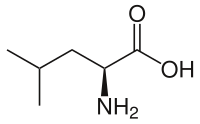
Photo from wikipedia
Up to 40% of patients with epilepsy experience seizures despite treatment with antiepileptic drugs; however, branched-chain amino acid (BCAA) supplementation has shown promise in treating refractory epilepsy. The purpose of… Click to show full abstract
Up to 40% of patients with epilepsy experience seizures despite treatment with antiepileptic drugs; however, branched-chain amino acid (BCAA) supplementation has shown promise in treating refractory epilepsy. The purpose of this systematic review was to evaluate all published studies that investigated the effects of BCAAs on seizures, emphasizing therapeutic efficacy and possible underlying mechanisms. On 31 January, 2017, the following databases were searched for relevant studies: MEDLINE (OvidSP), EMBASE (OvidSP), Scopus (Elsevier), the Cochrane Library, and the unindexed material in PubMed (National Library of Medicine/National Institutes of Health). The searches were repeated in all databases on 18 February, 2019. We only included full-length preclinical and clinical studies that were published in the English language that examined the effects of BCAA administration on seizures. Eleven of 2045 studies met our inclusion criteria: ten studies were conducted in animal models and one study in human subjects. Seven seizure models were investigated: the strychnine (one study), pentylenetetrazole (two studies), flurothyl (one study), picrotoxin (two studies), genetic absence epilepsy in rats (one study), kainic acid (two studies), and methionine sulfoximine (one study) paradigms. Three studies investigated the effect of a BCAA mixture whereas the other studies explored the effects of individual BCAAs on seizures. In most animal models and in humans, BCAAs had potent anti-seizure effects. However, in the methionine sulfoximine model, long-term BCAA supplementation worsened seizure propagation and caused neuron loss, and in the genetic absence epilepsy in rats model, BCAAs exhibited pro-seizure effects. The contradictory effects of BCAAs on seizure activity likely reflect differences in the complex mechanisms that underlie seizure disorders. Some of these mechanisms are likely mediated by BCAA’s effects on glucose, glutamate, glutamine, and ammonia metabolism, activation of the mechanistic target of rapamycin signaling pathway, and their effects on aromatic amino acid transport and neurotransmitter synthesis. We propose that a better understanding of mechanisms by which BCAAs affect seizures and neuronal viability is needed to advance the field of BCAA supplementation in epilepsy.
Journal Title: CNS Drugs
Year Published: 2019
Link to full text (if available)
Share on Social Media: Sign Up to like & get
recommendations!